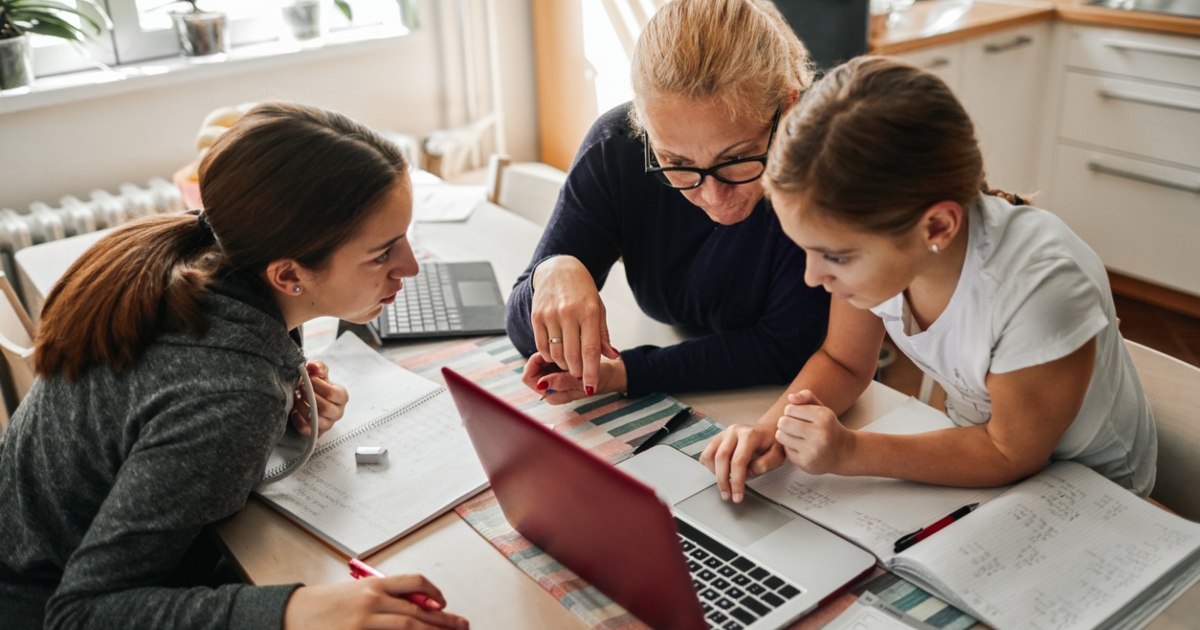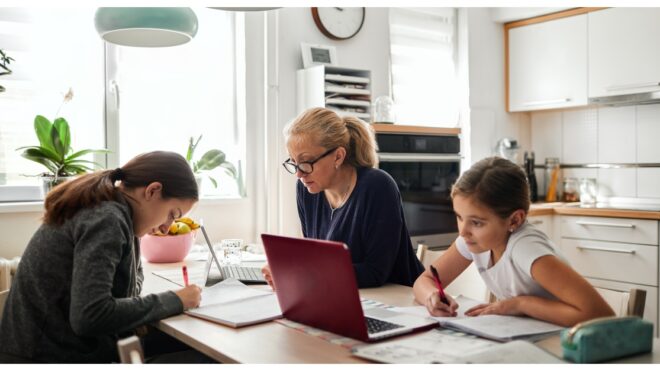
This school year is truly unlike any that any of us have experienced. In general, families are choosing between three options: in-person learning at school, distance learning from home, and homeschooling. As a veteran homeschool mom, I know how scary it can feel to choose that third option … but I also know how amazing it can feel to get a handle on homeschooling and to make it work for your family.
We happened into homeschooling by accident. It was never our intention, we weren't faced with a global health crisis, and we were committed to the idea of our son attending our neighborhood school. However, the neighborhood school in question wasn't prepared to adequately attend to our son's health conditions (they're all mild, but they are important to understand), and we felt stuck. We decided to try homeschooling for a semester or so, while looking for another school in our city that could work.
We ended up just totally loving homeschooling. That doesn't mean it's easy all the time (it is quite challenging plenty of the time), and it doesn't mean that we do it perfectly (we absolutely do not), it just means that it really fits with our general dynamic and interests, and, in regular times, it makes our habit of frequent travel a lot easier.
But if there's one thing I think more families need to understand these days, it's that distance learning at home and homeschooling are two totally different beasts. If you aren't buying and planning your child's curriculum, you're not really homeschooling. Homeschooling encompasses a lot, but it usually doesn't include teachers, lessons, and materials that are provided by your kid's school.
Because homeschooling can be super intimidating from the jump, I put together this list of tips that I wish I had known that will hopefully help other families who are diving into homeschooling for the first time.
1. Understand that you will totally follow a pattern.
One of the funniest things about homeschooling (at least to me) is that there is totally a pattern nearly every parent goes through. It's something like this:
- Parent gets really, really excited about homeschooling and begins scouring the internet for resources and lesson ideas that will dazzle their child. Parent is so enlightened!
- Parent pushes themselves to make sure those dazzling lessons are completed and their children are learning about a wide berth of things: A week on Ukraine! Learning a second language! A third! A whole entire month on every single detail about bugs!
- Parent begins to burn out, child begins to resist, and it starts to feel impossible to keep going.
- Parent and child either force themselves to keep going and get mad at each other or step back totally, and several weeks go by where no one is learning anything.
- Parent starts again … in a more scaled-back fashion.
The exact details of your specific journey through the first few months of homeschooling might vary, but I’d be really surprised if they don’t resemble this, at least a little bit. Know that it’s totally OK to go through this cycle, to question everything you’re doing, to feel like giving up — and then prepare to strip it way, way down.
2. Homeschooling doesn't have to look like school.
The first mistake I made when we began homeschooling was assuming that homeschooling would look like in-person schooling, but at our kitchen table. So I set up all these cute lessons and crafts, I got my son a little desk, and I made sure we sat there for our required four hours and worked, worked, worked. And then … he got mad, I got mad, and we both realized the situation was not great.
I started asking other homeschooling parents what I should do, and I was amazed when most of them said, "He's in first grade? Maybe nothing." As in, don't do anything that we weren't doing just because we liked to. In other words, keep reading books together. Make crafts when we feel like it. Watch some PBS Nature documentaries. Go outside and enjoy the sun. Look for bugs under logs.
The goal became less about making sure our homeschooling experience looked like something that happened in a classroom and more about integrating learning into every aspect of our lives. When I realized that a lot of what we already did for fun was learning, it changed the way I looked at homeschooling completely.
3. Play to your child's strengths.
I spent a lot of our early months and years really focused on making sure my son's academic weaknesses were addressed. Except, y'all, I have not been trained as a teacher and really didn't have the tools to adequately address a lot of those weaknesses.
For example, we started running into problems with math around third grade. Instead of looping in an actual professional, I tried to plow through, and the result was that not only did my kid not really learn math that year, it impacted how he learned math in the years that followed. He's doing well in math now (thanks completely to the tutoring service we eventually enrolled him in), even excelling and calling it his favorite subject some days, but it was a slow process that included a lot of tears (mostly mine).
Instead of focusing on what your child struggles at, fill your days playing to your child's strengths. This is one of the best gifts that homeschooling gives a family and a child: If you have a kid who is absolutely in love with wildlife biology, run away with it. You can spend six whole months just talking about wildlife biology if you want! There aren't rules; there aren't tests. All the metrics we have set up for kids are arbitrary, and a lot of them are based on situations your homeschooled child will never be in. Relax.
4. "When they want to learn it, they will."
By far, the hardest lesson I have learned is that when a child really wants to know how to do something, they will learn how to do it. You might have to give them tools that assist, but all the sticker charts in the world aren't going to teach your kid to read before they're ready.
I use reading as an example because I have truly lived that struggle. After my son started reading words from billboards at 3½ years old, I thought he'd be a super-early reader and just could not wait. Fast-forward to two years later, when the idea of reading a book himself filled him with anxiety that manifested in physical ways. He was super stressed out. I was stressed out. It was terrible. This was a kid who loved (and still loves) being read to! What was going on?
A few months later, I met my friend Holly, who has four children and has been through it all. She told me a simple truth: When my son wanted to learn to read, he would do it. So, reluctantly, we tried to back off … and lo and behold, he started reading actual books around the age of 8 and never looked back. He now spends hours of his day reading giant chapter books about dragons and knights and who the heck knows what.
5. It doesn't matter what other families do.
When you start getting into homeschooling, you're going to meet a lot of other families who are probably doing things very differently from you. Depending on where you're at in your journey, you'll think either your way is superior (because you're a new homeschooling parent) or your way is awful (because you're a new homeschooling parent).
I remember being overwhelmed when I first met families who described themselves as unschoolers. Unschooling is like homeschooling but with even less direction: Children get to choose what they learn, how they learn it, when they learn it, and so on. It's overwhelming! I thought that some of the parents were borderline abusive when they let their kids run outside all day long, only pausing to drink water and eat half a sandwich.
But now? Now I get it. There is really no right or wrong way to homeschool if your goal is to give your kids an enriching, empowering experience. Don't judge other families, and they won't judge yours.







